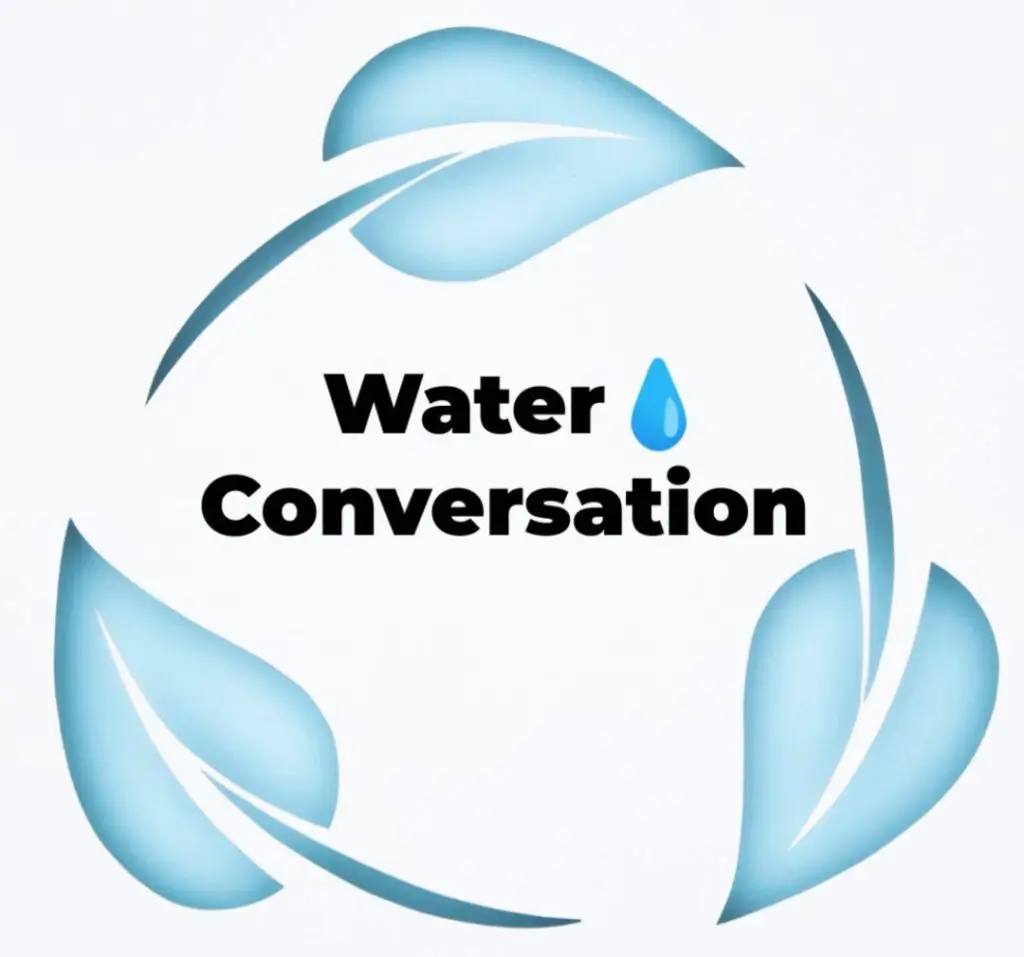Water conservation plays a crucial role in sustainable living. As our population continues to grow and global climate change becomes more evident, preserving and efficiently utilizing this precious resource has become increasingly important. By adopting simple yet impactful strategies like reducing water usage, practicing rainwater harvesting, and implementing efficient irrigation systems, individuals can contribute to the preservation of water and create a more sustainable future for generations to come.
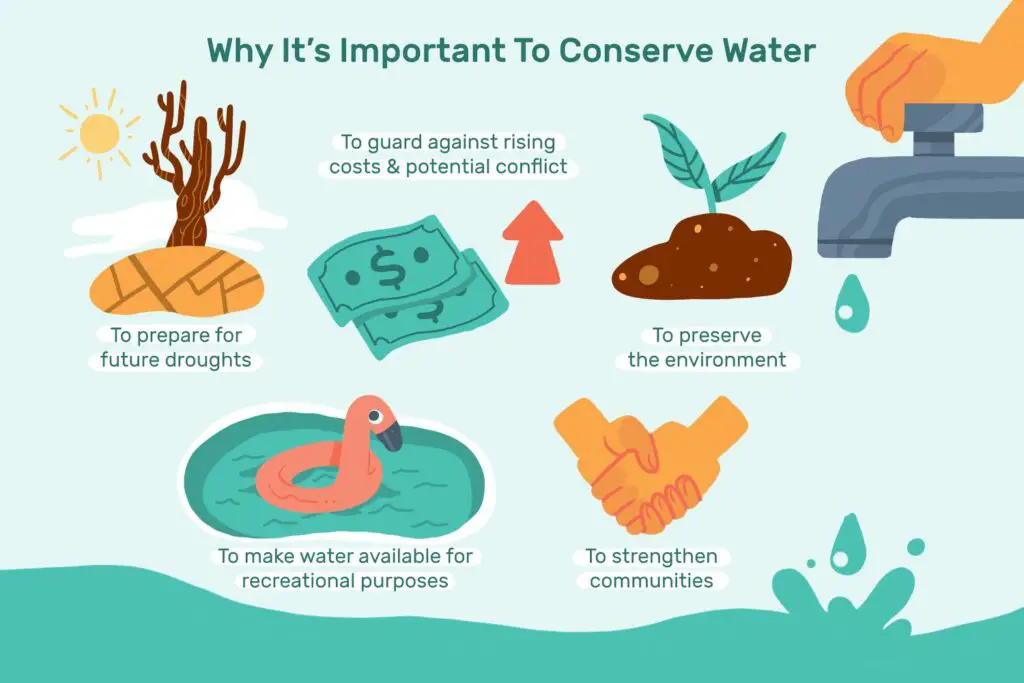
Water scarcity and its implications
Water scarcity is a critical issue that affects numerous communities around the world. With limited freshwater resources, the demand for water exceeds its availability in many regions. This scarcity has grave implications for both people and the environment.
Limited freshwater resources
Freshwater resources constitute only a small portion of the Earth’s total water supply, with around 2.5% being freshwater. Moreover, the majority of this freshwater is locked up in icecaps and glaciers, leaving only a meager percentage accessible for human use. As the world’s population continues to grow, the demand for freshwater increases, putting immense pressure on the already limited resources.
Growing population and increasing demand
The global population is projected to reach 9.7 billion by 2050, further exacerbating the demand for water. As more people require water for everyday activities such as drinking, cooking, irrigation, and sanitation, the strain on water resources intensifies. This increased demand can lead to water shortages, affecting not only human populations but also various sectors, including agriculture, industry, and ecosystems.
Impact on ecosystems and biodiversity
Water scarcity has direct and indirect impacts on ecosystems and biodiversity. Decreased water availability disrupts the delicate balance of aquatic ecosystems, leading to the loss of habitats and threatening the survival of numerous species. Additionally, the diversion of water for human activities can alter natural flow patterns, further compromising the health and biodiversity of ecosystems. Thus, water scarcity poses a significant threat to the overall sustainability of natural environments.
Conservation as a sustainable solution
To address the pressing issue of water scarcity, water conservation is a crucial step towards sustainable living. By implementing effective strategies and practices, we can optimize water use and preserve this precious resource for generations to come.
Definition and objectives of water conservation
Water conservation involves the responsible and efficient management of water resources to minimize waste and promote sustainability. The objectives of water conservation include reducing water consumption, preserving water quality, protecting ecosystems, and ensuring equitable access to water for all.
Role of individuals, communities, and governments
Water conservation requires a collaborative effort from different stakeholders, including individuals, communities, and governments. Individuals can contribute by adopting water-saving habits in their daily lives, such as turning off taps when not in use, collecting rainwater for gardening, and fixing leaks promptly. Communities can organize awareness campaigns, share water-saving tips, and implement collective strategies like community gardening. Governments play a crucial role in water conservation by implementing policies, regulations, and infrastructure improvements to ensure sustainable water management.
Integration with sustainable development goals
Water conservation aligns with several Sustainable Development Goals (SDGs) set by the United Nations. These goals include ensuring access to clean water and sanitation for all (SDG 6), promoting sustainable agriculture (SDG 2), protecting life below water (SDG 14), and combating climate change (SDG 13). By integrating water conservation practices into our daily lives, we can contribute to achieving these vital goals and creating a more sustainable future.
Promoting awareness and education
Educating people about water conservation is crucial to create a collective understanding and encourage responsible water use habits. By raising awareness and providing information, we can empower individuals to make informed choices and contribute to sustainable water management.
Importance of educating people about water conservation
Many individuals are unaware of the implications of water scarcity and the simple steps they can take to conserve water. By educating people about the importance of water conservation, we can help them understand the impact of their actions and motivate them to adopt water-saving practices. Education also fosters a sense of responsibility and accountability, encouraging individuals to take action and make a positive difference.
Encouraging responsible water use habits
Education plays a vital role in promoting responsible water use habits. It helps individuals understand the significance of small actions, such as taking shorter showers, using full loads in washing machines and dishwashers, and fixing leaks promptly. By fostering a culture of responsible water use, we can collectively contribute to conserving water and reducing waste.
Implementing educational programs and campaigns
To effectively educate and engage people in water conservation efforts, implementing educational programs and campaigns is essential. These initiatives can be targeted at schools, community centers, workplaces, and online platforms. By providing information, resources, and practical tips, educational programs and campaigns can empower individuals to make a positive change in their water consumption habits.
Efficient water management techniques
Efficient water management techniques play a pivotal role in conserving water and optimizing its use. Through the implementation of innovative technologies and practices, we can significantly reduce water wastage and ensure the sustainable utilization of this finite resource.
Introduction to water-saving technologies
Water-saving technologies offer effective methods to minimize water consumption while maintaining efficient functionality. Examples include low-flow fixtures in homes and buildings that reduce water flow without compromising performance, such as low-flow toilets, showerheads, and faucets. Additionally, smart irrigation systems equipped with soil moisture sensors and weather data can ensure precise watering, reducing water waste and promoting efficient plant growth.
Importance of efficient irrigation systems
Agriculture accounts for a significant portion of global water consumption. Efficient irrigation systems in agriculture are indispensable for conserving water. Drip irrigation, for instance, delivers water directly to the roots, minimizing evaporation and runoff. Additionally, precision sprinkler systems and improved irrigation scheduling techniques help optimize water usage in farming, contributing to water conservation efforts.
Rainwater harvesting and graywater recycling
Rainwater harvesting and graywater recycling are innovative techniques that maximize water utilization. Rainwater harvesting involves collecting and storing rainfall for future use in gardens, landscaping, and other non-potable purposes. Graywater recycling refers to the treatment and reuse of wastewater from sources such as sinks, showers, and washing machines for purposes other than drinking, such as toilet flushing and irrigation. Both practices significantly reduce the demand for freshwater and alleviate pressure on water resources.
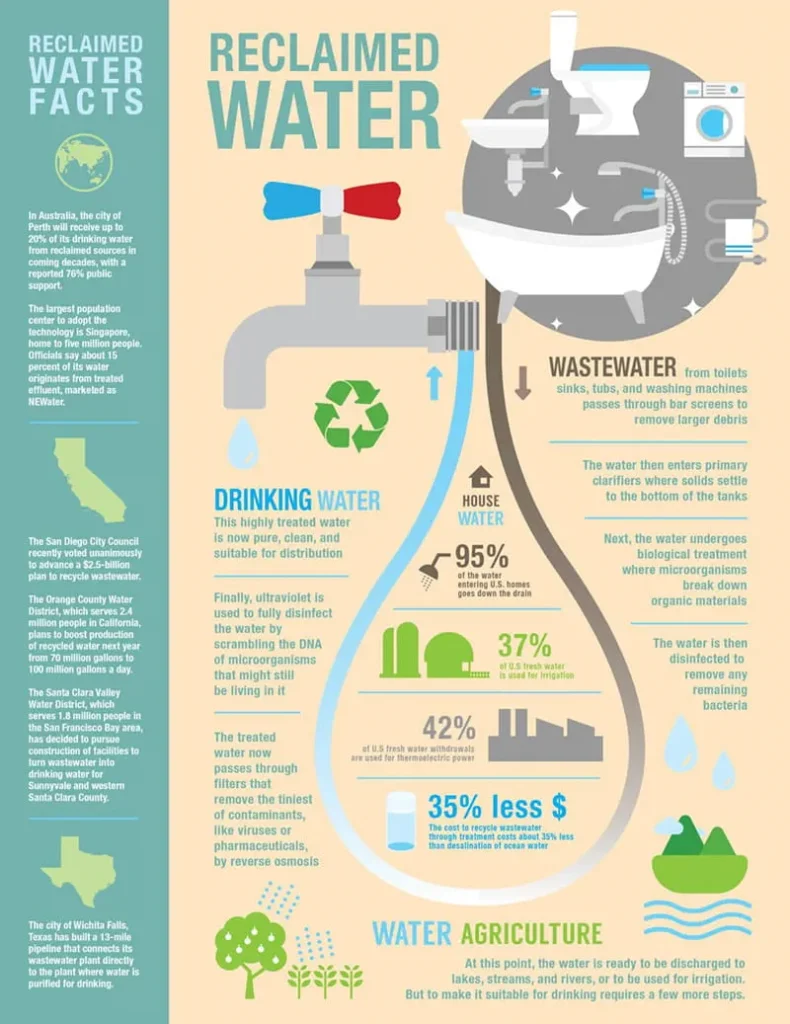
Reducing water wastage in households
Households account for a significant portion of water consumption, making it crucial to identify and address sources of water wastage. By implementing simple measures and behavioral changes, we can minimize water waste and contribute to sustainable living.
Identifying and fixing water leaks
Water leaks are a common source of wastage, often unnoticed until they result in significant water loss. Regularly inspecting plumbing systems and promptly fixing leaks can prevent substantial wastage and conserve water. Simple actions like checking faucets, pipes, and toilets for leaks can make a significant impact on reducing water waste.
Using low-flow fixtures and appliances
Replacing outdated fixtures and appliances with low-flow alternatives is an effective way to save water. Low-flow toilets, showerheads, and aerators limit water usage without sacrificing performance. Energy-efficient washing machines and dishwashers also contribute to water conservation by using less water per cycle. By investing in these water-saving fixtures and appliances, households can make a significant difference in reducing water consumption.
Behavioral changes for water conservation at home
In addition to infrastructure improvements, behavioral changes play a crucial role in water conservation. Simple habits like turning off the faucet while brushing teeth, taking shorter showers, and only running full loads in washing machines and dishwashers can make a noticeable impact. By cultivating a mindful approach to water use, we can collectively reduce water waste and contribute to sustainable living.
Water conservation in agriculture
Agriculture is a water-intensive industry, accounting for a significant proportion of global water consumption. Implementing sustainable farming practices and utilizing efficient water management techniques are vital to conserving water in agricultural operations.
Water-intensive nature of agriculture
Agriculture requires substantial amounts of water for irrigation, livestock watering, and crop production. In many regions, excessive water usage in farming contributes to water scarcity and strains water resources. Addressing the water-intensive nature of agriculture is crucial for sustainable water management.
Sustainable farming practices for water conservation
Implementing sustainable farming practices can significantly reduce water consumption in agriculture. Techniques such as precision farming, crop rotation, mulching, and soil moisture monitoring contribute to efficient water usage. By optimizing irrigation scheduling, choosing drought-tolerant crops, and implementing water-efficient techniques like drip irrigation, farmers can conserve water and enhance the overall sustainability of agricultural operations.
Smart irrigation systems and precision agriculture
Smart irrigation systems equipped with sensors and data analytics offer precise watering methods, minimizing water waste. These systems consider parameters such as soil moisture, weather conditions, and crop water requirements to deliver the right amount of water at the right time. Coupled with precision agriculture techniques that enhance farming precision and minimize resource use, smart irrigation systems play a crucial role in water conservation within the agricultural sector.
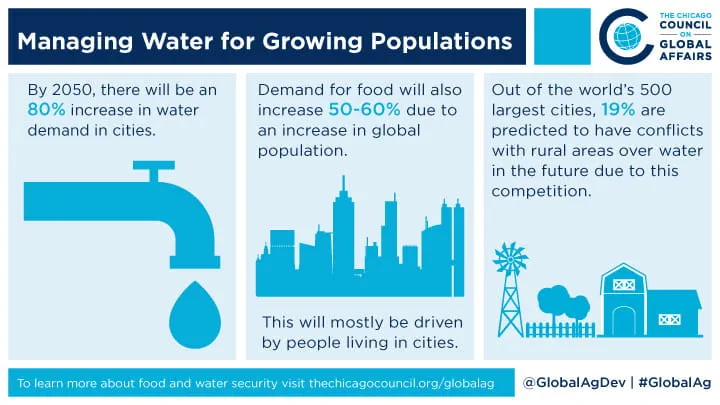
Industrial water management
Industrial processes also contribute significantly to water consumption and have a responsibility to implement water conservation practices. By adopting efficient water management techniques and promoting recycling and reuse, industries can minimize their impact on water resources.
Water conservation practices in industries
Industries can implement various water conservation practices to reduce water consumption. These practices include optimizing production processes to minimize water usage, monitoring and repairing leaks, and implementing efficient cooling technologies. By adopting these practices, industries can contribute to sustainable water management and conserve this valuable resource.
Recycling and reuse of water in manufacturing processes
Recycling and reusing water within manufacturing processes is an effective strategy to minimize water wastage. Treatment systems can purify and recycle wastewater generated in industrial processes, making it suitable for non-potable purposes within the facility. By reducing reliance on freshwater sources and implementing water recycling infrastructure, industries can make significant strides in water conservation.
Regulatory measures for industrial water conservation
Governments play a pivotal role in promoting industrial water conservation. Through regulations, incentives, and monitoring mechanisms, policymakers can encourage industries to adopt water-efficient practices. Establishing water usage targets, implementing water pricing mechanisms, and providing support for research and development in water-saving technologies are essential steps toward ensuring sustainable water management in the industrial sector.
Conservation in commercial establishments
Commercial establishments, such as hotels, restaurants, and office buildings, also have a responsibility to practice water conservation. By implementing water-saving measures, these establishments can set an example for sustainable water use and make a positive impact on the environment.
Importance of water conservation in commercial settings
Commercial establishments are often large consumers of water due to their size, operations, and high footfall. By embracing water conservation practices, these establishments can significantly reduce their water footprint and contribute to the overall conservation efforts. Additionally, sustainable water management can enhance operational efficiency, reduce costs, and improve the reputation of commercial establishments in the eyes of environmentally conscious customers.
Implementing water-saving measures in hotels, restaurants, etc.
Commercial establishments can adopt various measures to conserve water. Installing low-flow fixtures in washrooms, kitchens, and public areas can significantly reduce water consumption without compromising functionality. Implementing water recycling systems for laundry and dishwashing can further contribute to water conservation. Additionally, staff training programs and awareness campaigns can help employees understand the importance of water conservation and encourage responsible water use practices within the establishment.
Businesses as role models for sustainable water use
By actively practicing water conservation, commercial establishments can serve as role models for sustainable water use. When businesses prioritize water conservation and communicate their efforts to customers, they create awareness and inspire others to follow suit. The collective impact of such initiatives can contribute to overall water conservation efforts and create a more sustainable future.
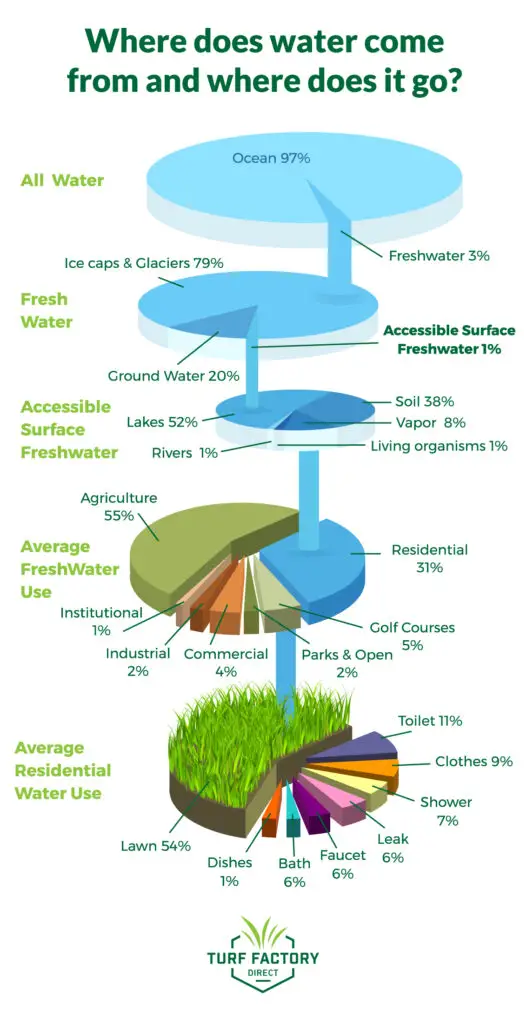
The role of technology and innovation
Technological advancements and innovation offer promising solutions to the challenges of water conservation. By investing in research and development, promoting smart systems, and leveraging technological advancements, we can optimize water management and contribute to sustainable living.
Advancements in water conservation technologies
Continuous advancements in water conservation technologies provide innovative solutions for efficient water management. These technologies include moisture sensors for irrigation systems, leak detection systems, and automated water management systems. By leveraging these advancements, we can enhance the accuracy, effectiveness, and sustainability of water conservation efforts.
Monitoring and managing water usage through smart systems
Smart systems equipped with sensors and data analytics enable real-time monitoring and management of water usage. These systems can track water consumption, detect leaks, and optimize water usage automatically. By providing valuable insights and facilitating proactive water management, smart systems empower individuals, communities, and industries to make informed decisions and minimize water waste.
Encouraging research and development in water-saving solutions
Investing in research and development is crucial for driving innovation in water-saving solutions. By supporting scientists, engineers, and innovators in their quest to develop new technologies, governments, and organizations can accelerate the adoption of water conservation practices. Funding research, creating innovation hubs, and promoting collaborations can lead to groundbreaking solutions that tackle water scarcity and promote sustainable water use.
Conclusion
Water conservation is a critical aspect of sustainable living. The scarcity of freshwater resources, coupled with a growing population and increasing demand, highlights the urgency of conserving water for future generations. By promoting awareness and education, implementing efficient water management techniques, and embracing innovative solutions, we can make a significant difference in addressing water scarcity and ensuring a sustainable future.
There is no time to waste. It is essential for individuals, communities, and policymakers to recognize the importance of water conservation and take immediate action. By adopting responsible water use habits, supporting water-saving initiatives, and advocating for policies that prioritize sustainable water management, we can work together to preserve this valuable resource and secure a better future for ourselves and the planet. Let us all take the necessary steps towards conserving water and making sustainable living a reality for everyone.
